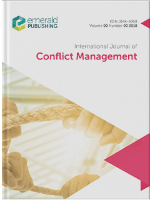
INTERNATIONAL JOURNAL OF CONFLICT MANAGEMENT
Scope & Guideline
Navigating the Complexities of Conflict Resolution
Introduction
Aims and Scopes
- Interpersonal and Organizational Conflict Management:
The journal focuses on the intricacies of conflict within interpersonal and organizational contexts, examining how different management styles, leadership behaviors, and employee relations influence conflict dynamics. - Emotional Intelligence and Conflict Resolution:
A significant area of research involves the role of emotional intelligence in conflict management, highlighting how emotional awareness and regulation can improve outcomes in conflict situations. - Cultural and Contextual Influences on Conflict:
The journal explores how cultural differences and contextual factors shape conflict perceptions and management strategies, providing insights into cross-cultural negotiations and international conflict resolution. - Bullying, Incivility, and Workplace Behavior:
Research addressing workplace bullying, incivility, and their effects on employee behavior and organizational climate is prevalent, emphasizing the need for effective conflict management strategies in maintaining a healthy work environment. - Innovative Approaches to Conflict:
The journal also encourages innovative methodologies and frameworks for understanding conflict, including the use of technology and new theoretical perspectives to analyze conflict dynamics.
Trending and Emerging
- Impact of Remote Work on Conflict Dynamics:
With the rise of remote work, there is an increasing focus on how virtual environments affect conflict dynamics, communication, and team collaboration. - Role of Emotional and Psychological Factors:
Research is trending towards understanding the psychological aspects of conflict, including emotional exhaustion, emotional intelligence, and their implications for conflict resolution. - Intersection of Conflict and Diversity Issues:
Emerging themes include the intersection of conflict management with diversity, equity, and inclusion, particularly how these factors influence workplace relationships and conflict management strategies. - Technological Influences on Conflict Management:
There is a growing interest in exploring how technology and social media impact conflict interactions and resolutions, particularly in organizational settings. - Focus on Health and Well-Being in Conflict Contexts:
Recent studies highlight the importance of health and well-being in conflict management, examining how workplace incivility and conflict affect mental health and organizational outcomes.
Declining or Waning
- Traditional Conflict Management Theories:
There has been a noticeable decline in papers centered on traditional conflict management theories, as newer frameworks and interdisciplinary approaches gain traction. - Focus on Conflict in Non-Corporate Settings:
Research addressing conflict in non-corporate settings, such as community or family conflicts, appears to be waning, with a stronger emphasis shifting towards corporate and organizational contexts. - Static Approaches to Conflict Resolution:
There is a reduction in studies advocating static or one-size-fits-all approaches to conflict resolution, as the complexity and variability of conflict situations are increasingly recognized. - Overemphasis on Quantitative Methods:
While quantitative research remains important, there is a declining emphasis on purely quantitative methodologies, with a growing preference for mixed-methods and qualitative approaches that provide deeper insights. - Simplistic Views on Leadership and Conflict:
Studies that present overly simplistic views of leadership styles in relation to conflict management are becoming less common, as the field moves towards more nuanced understandings of leadership dynamics.
Similar Journals

African Journal of Library Archives and Information Science
Championing Best Practices in Information Services.The African Journal of Library Archives and Information Science (ISSN: 0795-4778; E-ISSN: 0795-4778) is a pivotal publication in the field of Library and Information Sciences, published by ARCHLIB & INFORMATION SERVICES LTD in Nigeria. With a focus on the diverse and evolving challenges faced by libraries and information professionals in the African context, this journal serves as a platform for scholarly communication, fostering innovation and collaboration among researchers, practitioners, and academics. The journal has a notable impact factor, reflected in its Q3 ranking within the category for 2023, and is indexed in Scopus, holding a percentile rank of 22nd in its field, further validating its relevance and scholarly contribution. Running since 2008 with continual publications through to 2024, the journal aims to advance knowledge, share best practices, and highlight emerging trends in librarianship and information science across Africa and beyond. By offering open access options, it ensures wide dissemination of knowledge, making it an essential resource for those dedicated to enhancing information services and archives.

Conflict Studies Quarterly
Innovating research for transformative conflict solutions.Conflict Studies Quarterly is an esteemed open-access journal dedicated to the in-depth exploration of conflict research, covering critical themes such as peace studies, conflict resolution, and socio-political dynamics. Published by ACCENT PUBLISHER since 2012, this journal emphasizes fostering interdisciplinary dialogue among researchers, policymakers, and practitioners in the field of conflict studies. With its commitment to accessibility and the dissemination of scholarly work, Conflict Studies Quarterly plays a pivotal role in advancing knowledge and understanding of conflict related issues globally. The journal provides a vital platform for sharing rigorous research and innovative perspectives, making it a valuable resource for professionals, academics, and students keen on addressing complex global challenges.

Economics of Peace and Security Journal
Transforming Economic Policies into Peacebuilding ActionsEconomics of Peace and Security Journal, published by ECONOMISTS PEACE & SECURITY, serves as a critical platform for scholarship focusing on the intersections of economics, peacebuilding, and international relations. With an ISSN of 1749-852X, this interdisciplinary journal aims to explore the economic dimensions of peace and security, fostering a deeper understanding of how economic policies can influence stability worldwide. Despite its current standing in the Q4 quartile across various categories, including Economics and Political Science, the journal plays an essential role in advancing research on pressing global issues. By providing insightful analyses and empirical studies, it engages researchers, students, and policymakers in discussions that can lead to effective strategies for conflict resolution and sustainable economic practices. Although it currently offers limited access options, the aspirations for broader dissemination underscore its importance in contributing to the ongoing dialogue surrounding peace and security economics. Join the conversation and contribute to this evolving field as it navigates a complex and dynamic global landscape.
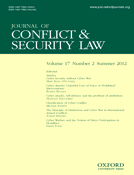
JOURNAL OF CONFLICT & SECURITY LAW
Empowering Research on Law and Security ChallengesThe Journal of Conflict & Security Law, published by Oxford University Press, is an essential source of scholarly information in the fields of law, conflict studies, and security policy. With an ISSN of 1467-7954 and an E-ISSN of 1467-7962, this journal has been a significant platform for rigorous academic discourse since its inception in 2005. It is recognized for its contributions to the legal frameworks surrounding conflict and security, currently holding a Q3 ranking in Law and Q4 in both Safety Research and Safety, Risk, Reliability, and Quality for the year 2023. With its Scopus rankings placing it in the 61st percentile in Social Sciences Law, the journal serves as a key reference point for researchers and professionals looking to navigate the complexities of contemporary security challenges. Though the journal is not open access, its detailed analyses are critical for informed policy-making and academic inquiry, making it indispensable for students, scholars, and practitioners alike. For comprehensive insights and empirical studies, Journal of Conflict & Security Law remains at the forefront of legal and security research.
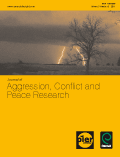
Journal of Aggression Conflict and Peace Research
Exploring the dynamics of aggression and resolution.Welcome to the Journal of Aggression Conflict and Peace Research, a pioneering platform dedicated to advancing the understanding of aggression, conflict resolution, and peace studies. Published by EMERALD GROUP PUBLISHING LTD, this esteemed journal is recognized for its significant contributions to interdisciplinary research, achieving a prominent position within the academic community with a 2023 ranking of Q2 in fields such as Law and Sociology and Political Science. Striding across various domains, including social psychology and health, the journal's scope extends from 2009 to 2024, illuminating contemporary challenges and innovative solutions to violence and disagreement in society. Although not currently open access, the journal remains accessible to a diverse readership keen on exploring the complex interplay of aggression and conflict with peace and reconciliation efforts. Stay informed with the latest research that shapes policy and promotes social welfare in a world facing rising tensions.
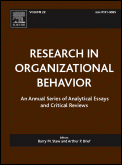
Research in Organizational Behavior
Advancing insights into the dynamics of organizational behavior.Research in Organizational Behavior, published by ELSEVIER SCIENCE INC, is a premier academic journal dedicated to advancing our understanding of organizational behavior through innovative research and critical insights. With an ISSN of 0191-3085 and an established presence since its convergence years from 2000 to 2023, the journal is recognized for its rigorous peer-reviewed articles that explore various dimensions of human behavior within organizational settings. The journal proudly holds prestigious quartile rankings, including Q1 in Experimental and Cognitive Psychology and Social Psychology, reaffirming its impact and relevance in the fields of Organizational Behavior and Human Resource Management. Although it does not offer open access, Research in Organizational Behavior serves as an essential resource for researchers, professionals, and students looking to deepen their understanding of the complexities influencing behavior and decision-making in organizational contexts. By bridging the gap between theory and practice, this journal plays a crucial role in shaping the future of organizational studies.
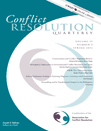
Conflict Resolution Quarterly
Bridging disciplines to illuminate conflict dynamics.Conflict Resolution Quarterly, published by WILEY PERIODICALS, INC, serves as a pivotal academic platform specializing in the interdisciplinary fields of law and psychology. With ISSN 1536-5581 and E-ISSN 1541-1508, this journal is dedicated to advancing the understanding of conflict dynamics and resolution strategies from both legal and psychological perspectives. As a recognized journal with a Q2 ranking in Law and a Q3 ranking in Psychology for the year 2023, it occupies an essential niche for scholars and practitioners interested in the complexities of conflict resolution. The journal's commitment to fostering a rich dialogue between various disciplines enhances its relevance in today's globalized world, where conflicts are multifaceted and require nuanced approaches. Covering converged years from 2005 to 2024, it provides a valuable repository of research, case studies, and theoretical discussions that benefit researchers, professionals, and students alike. Although it does not offer open access, its esteemed reputation and broad scope ensure significant impacts in both legal and psychological domains.

All Azimuth-A Journal of Foreign Policy and Peace
Fostering understanding through scholarly insights.All Azimuth - A Journal of Foreign Policy and Peace is a leading academic journal dedicated to the exploration and analysis of foreign policy dynamics, conflict resolution, and peace studies. Published by the CENTER FOREIGN POLICY & PEACE RESEARCH in Turkey, this journal serves as a crucial platform for scholars and practitioners aiming to address pressing global issues. With a prestigious Q1 category ranking in Political Science and International Relations, and a noteworthy Scopus rank of #263 out of 706 in its field, All Azimuth is recognized for its impactful contributions to the academic community. The journal, operating under an open access model, is committed to providing unrestricted access to high-quality research, fostering collaboration, and enhancing knowledge dissemination across disciplines. Since its inception in 2012, All Azimuth has become an essential resource for researchers, professionals, and students who seek to deepen their understanding of international relations and peace policies, making significant strides towards resolving global conflicts and promoting sustainable peace.
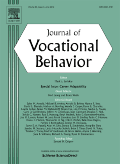
JOURNAL OF VOCATIONAL BEHAVIOR
Innovating insights into vocational behavior and practice.JOURNAL OF VOCATIONAL BEHAVIOR, published by Academic Press Inc Elsevier Science, stands as a premier outlet for scholarly discourse in the fields of applied psychology, education, lifespan studies, and organizational behavior. With an impressive impact factor and a consistent ranking within the top quartiles (Q1) across multiple categories for 2023, this journal serves as an essential resource for researchers, practitioners, and students seeking to enhance their understanding of vocational behavior and its implications in diverse settings. The journal has been publishing since its inception in 1971 and continues to provide a vital platform for innovative research that informs both theory and practice, enabling professionals to address the complexities of workforce dynamics in an ever-evolving landscape. Notably, the journal is recognized for its rigorous peer-review process and impactful contributions, ensuring that every article presents cutting-edge findings and promotes evidence-based practices. Although it does not offer open-access options, its importance and relevance in the academic community make it an indispensable reference point for those dedicated to advancing knowledge in vocational studies.
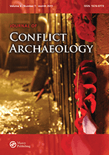
Journal of Conflict Archaeology
Unearthing the Past: Exploring Conflict Through ArchaeologyJournal of Conflict Archaeology, published by Routledge Journals, Taylor & Francis Ltd, is a pivotal periodical in the field of archaeology and history, focusing on the intersections between human conflict and archaeological practice. With a robust ISSN of 1574-0773 and E-ISSN 1574-0781, this journal not only presents innovative research findings but also catalyzes critical discussions on how conflicts shape and are shaped by material culture. Spanning volumes since 2005 and continuing through 2024, the journal is ranked in category quartiles, achieving Q3 status in Archeology and Arts & Humanities, and Q2 in History by 2023 metrics, illustrating its significant contribution to academic discourse. The Journal of Conflict Archaeology emphasizes accessibility for scholars and practitioners, making valuable insights available to those navigating the complexities of archaeology in context to historical conflicts. With research that is cited within the 78th and 67th percentiles of its respective fields, this journal serves as an essential resource for researchers, professionals, and students aiming to deepen their understanding of archaeological methodologies in conflict studies.